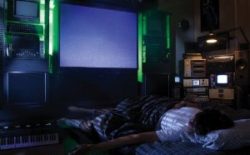Available on: Software LP
“No more lo-fi” promises the androgynous protagonist of Channel Pressure. It’s a self-aware, self-directed challenge, referencing the fact that one of the most endearing and impressively accurate facsimiles of ’80s pop made in recent years has been the work of someone more associated with noise and drone than anything else, Daniel ‘Oneohtrix Point Never’ Lopatin. Here, together with his partner in the Software record label, Joel Ford, he returns with a full-length album that mostly makes good on the promise for dreamy, straightforward pop hinted at on last year’s Ford & Lopatin EP That We Can Play (released as Games). But no more lo-fi? Only sort of.
Channel Pressure is almost a pop album. Most of the tracks here are full songs – with vocals and everything – and their shimmering iridescent textures are the love children of two full-on gear nerds. In this regard Ford & Lopatin have the upper hand against their would-be haircut pop contemporaries, but their love for circuitry and wiring also means that the songs can get lost in a haze of effects and analogue glitchery. A track like ‘Break Inside’ tramples over its gorgeous chorus with wandering synths and meandering melodies that merely clash, while the album’s mid-section feels crumbly and transient, leftover tendencies from Oneohtrix’s Returnal clouding the album’s chrome.
That fogged ethereality also extends itself to the album’s vocal performances, many of them performed by Lopatin. Whether it’s aesthetic preference or the disguising of technical deficiency, they’re multi-tracked and pitch-shifted to alien extremes that often sit uncomfortably with the album’s otherwise pop potential (‘Emergency Room’, ‘Channel Pressure’) or are simply too washed-out to provide the character they’re striving for (the awkward ‘Joey Rogers’).
For all of its flaws though, Channel Pressure can be an exhilarating and affecting listen. The devil’s often in the details, and even almost-derailed tunes like the title track have impossibly vivid squalls of colour that make them hard not to love. There are a few moments of enviable synthesis where all the crosswired electronics come together perfectly, and it makes you wish that the two had spent more time on crafting songs rather than bundles of effects. ‘Too Much MIDI (Please Forgive Me)’, with its grand but decaying chords, choked squawks of filtered guitar and chugging arpeggios, perfectly embodies all of the duo’s warring influences – noise, destruction, childlike naivete – into a mini-suite of ear-tickling melodies, exploding into a particularly memorable breakdown of gauche synth riffs and neutered heavy metal guitar growls.
On the other end of the spectrum is tender late album highlight ‘Surrender’, one of the few tracks with a proper (guest) vocal that really barrels into the kind of dreamy territory the album could have reached. Autre Ne Veut’s typically high-strung vocal strikes the more pleasant spectrum of tortured with his unnerving pleas of “talk to me for a minute, wait for me”, while the spectral timbres and wordless backing vocals recall Annie Lennox’s ‘No More I Love You’s’ in a way that feels completely honest instead of winkingly pastiche. It’s one of the album’s brilliant moments that briefly differentiates F&L from whatever acts might be placed alongside them.
The biggest problem with Channel Pressure is that it’s still not quite “no more lo-fi.” One gets the impression, rightly or wrongly, that Ford & Lopatin will never be more than a side project for Ford & Lopatin, a status that doesn’t quite mesh with the pop ambition of the material. It’s a grand and immaculate synth pop album trapped in the body of a half-finished wireframe, all of its synth innards uncomfortably visible and ruining the illusion. With better vocals and tighter songwriting, Channel Pressure could have been one of the best albums of the year, but instead its unfocused and volatile sprawl leaves it feeling showy and halfhearted. And showy it is: even if it’s not quite the sweeping epic of nostalgia-pop some of us might have hoped for, the production is rarely less than astounding.
Andrew Ryce

































